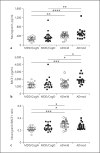Neurogranin and BACE1 in CSF as Potential Biomarkers Differentiating Depression with Cognitive Deficits from Early Alzheimer's Disease: A Pilot Study
- PMID: 30186306
- PMCID: PMC6120408
- DOI: 10.1159/000489847
Neurogranin and BACE1 in CSF as Potential Biomarkers Differentiating Depression with Cognitive Deficits from Early Alzheimer's Disease: A Pilot Study
Abstract
Background/aims: Major depressive disorder (MDD) can cooccur with early Alzheimer's disease (AD) or may cause memory problems independently of AD. Previous studies have suggested that the AD-related cerebrospinal fluid (CSF) biomarkers tau and Aβ(1-42) could help discriminate between early AD and depression unrelated to AD. Moreover, the postsynaptic protein neurogranin and presynaptic BACE1 have increasingly gained attention as potential new AD biomarkers, but they have not yet been investigated concerning depression.
Methods: Using ELISAs, we studied CSF neurogranin and BACE1 levels in patients with mild (n = 21) and moderate (n = 19) AD, as well as in MDD patients with (n = 20) and without (n = 20) cognitive deficits. The clinical examinations included analyses of t-tau, Aβ(1-42), and Aβ(1-40), besides neuropsychological tests and cranial magnetic resonance imaging. Depressive symptom severity was assessed using the Geriatric Depression Scale (GDS).
Results: Along with classic AD biomarkers, neurogranin and BACE1 CSF levels differed between moderate AD and MDD (p ≤ 0.01). MDD associated with cognitive deficits was distinguished from mild AD through the CSF neurogranin/BACE1 ratio (p < 0.05), which was strongly correlated with GDS scores (ρ = -0.656; p < 0.01).
Conclusion: The neurogranin/BACE1 ratio in CSF can distinguish between depression and AD among patients with similar cognitive deficits, along with the classic AD biomarkers. Further longitudinal studies are ongoing to identify which biomarkers have prognostic value.
Keywords: Alzheimer's disease; BACE1 protein; Cerebrospinal fluid; Depression; ELISA; Neurogranin.
Figures

Similar articles
-
The Cerebrospinal Fluid Neurogranin/BACE1 Ratio is a Potential Correlate of Cognitive Decline in Alzheimer's Disease.J Alzheimers Dis. 2016 Jul 6;53(4):1523-38. doi: 10.3233/JAD-160227. J Alzheimers Dis. 2016. PMID: 27392859 Free PMC article.
-
Increased neurogranin concentrations in cerebrospinal fluid of Alzheimer's disease and in mild cognitive impairment due to AD.J Neural Transm (Vienna). 2016 Dec;123(12):1443-1447. doi: 10.1007/s00702-016-1597-3. Epub 2016 Aug 16. J Neural Transm (Vienna). 2016. PMID: 27531278
-
BACE1 and Other Alzheimer's-Related Biomarkers in Cerebrospinal Fluid and Plasma Distinguish Alzheimer's Disease Patients from Cognitively-Impaired Neurosyphilis Patients.J Alzheimers Dis. 2020;77(1):313-322. doi: 10.3233/JAD-200362. J Alzheimers Dis. 2020. PMID: 32804135
-
A meta-analysis on CSF neurogranin levels for the diagnosis of Alzheimer's disease and mild cognitive impairment.Aging Clin Exp Res. 2020 Sep;32(9):1639-1646. doi: 10.1007/s40520-019-01326-z. Epub 2019 Aug 28. Aging Clin Exp Res. 2020. PMID: 31463927 Review.
-
Core candidate neurochemical and imaging biomarkers of Alzheimer's disease.Alzheimers Dement. 2008 Jan;4(1):38-48. doi: 10.1016/j.jalz.2007.08.006. Epub 2007 Dec 21. Alzheimers Dement. 2008. PMID: 18631949 Review.
Cited by
-
Biological Mechanism-based Neurology and Psychiatry: A BACE1/2 and Downstream Pathway Model.Curr Neuropharmacol. 2023;21(1):31-53. doi: 10.2174/1570159X19666211201095701. Curr Neuropharmacol. 2023. PMID: 34852743 Free PMC article.
-
Body Fluid Biomarkers for Alzheimer's Disease-An Up-To-Date Overview.Biomedicines. 2020 Oct 15;8(10):421. doi: 10.3390/biomedicines8100421. Biomedicines. 2020. PMID: 33076333 Free PMC article. Review.
-
Serum beta-secretase 1 (BACE1) activity as candidate biomarker for late-onset Alzheimer's disease.Geroscience. 2020 Feb;42(1):159-167. doi: 10.1007/s11357-019-00127-6. Epub 2019 Nov 19. Geroscience. 2020. PMID: 31745860 Free PMC article.
-
Differential Diagnosis Findings Between Alzheimer's Disease and Major Depressive Disorder: A Review.Psychiatry Clin Psychopharmacol. 2022 Mar 1;32(1):80-88. doi: 10.5152/pcp.2022.21133. eCollection 2022 Mar. Psychiatry Clin Psychopharmacol. 2022. PMID: 38764905 Free PMC article.
-
Clinical Utility of the Pathogenesis-Related Proteins in Alzheimer's Disease.Int J Mol Sci. 2020 Nov 17;21(22):8661. doi: 10.3390/ijms21228661. Int J Mol Sci. 2020. PMID: 33212853 Free PMC article. Review.
References
-
- Van der Mussele S, Fransen E, Struyfs H, Luyckx J, Mariën P, Saerens J, Somers N, Goeman J, De Deyn PP, Engelborghs S. Depression in mild cognitive impairment is associated with progression to Alzheimer's disease: a longitudinal study. J Alzheimers Dis. 2014;42:1239–36. - PubMed
-
- Leyhe T, Reynolds CF, 3rd, Melcher T, Linnemann C, Klöppel S, Blennow K, Zetterberg H, Dubois B, Lista S, Hampel H. A common challenge in older adults: classification, overlap, and therapy of depression and dementia. Alzheimers Dement. 2017;13:59–36. - PubMed
-
- Künig G, Jäger M, Stief V, Kaldune A, Urbaniok F, Endrass J. The impact of the CERAD-NP on diagnosis of cognitive deficiencies in late onset depression and Alzheimer's disease. Int J Geriatr Psychiatry. 2006;21:911–36. - PubMed
-
- Barth S, Schönknecht P, Pantel J, Schröder J. Mild cognitive impairment and Alzheimer's disease: an investigation of the CERAD-NP test battery (in German) Fortschr Neurol Psychiatr. 2005;73:568–36. - PubMed
LinkOut - more resources
Full Text Sources
Other Literature Sources

